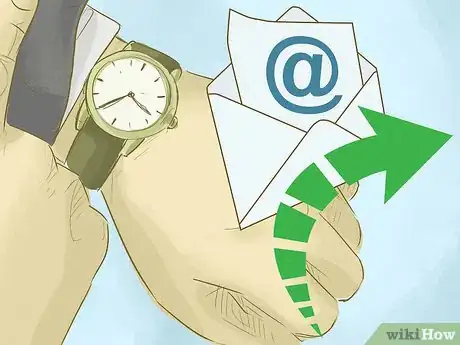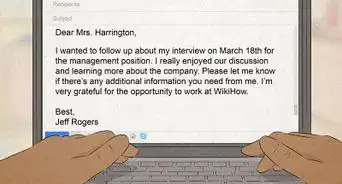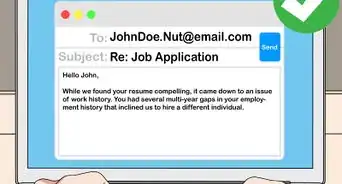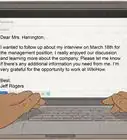This article was co-authored by wikiHow Staff. Our trained team of editors and researchers validate articles for accuracy and comprehensiveness. wikiHow's Content Management Team carefully monitors the work from our editorial staff to ensure that each article is backed by trusted research and meets our high quality standards.
This article has been viewed 22,364 times.
Learn more...
Landing a job in Singapore is not too different from getting one elsewhere. You have to be sure to know the requirements and then apply as early and often as possible. Networking is always a benefit for finding jobs, but may not be necessary if you’re applications are strong enough.
Steps
Finding Jobs in Singapore
-
1Check online job boards for local listings. Global sites like Monster, LinkedIn Jobs, and Glassdoor are used widely in Singapore. You can find a large variety of work listed on sites like these.[1]
- Online job boards offer a lot of conveniences, but they make it harder to stand out.
- If you find a job you like in the job board, go to that company’s site and see if you can apply directly through them. This will give you a chance to do some research on the company and position as well.
-
2Reach out and register with employment agencies. Recruiters can often have more jobs in hand than what you will find on the public job boards. Plus, since they are likely to get a cut from the employer, they will be especially motivated to help place you. This should not cost you anything.
- GMP, Adecco, Kelly Services and Recruit Express are some of the recruitment agencies you are likely to come across in Singapore.[2]
- Although you may get interview offers right away with a recruiter, it can take time to register you and find matches. The sooner you check in with the relevant agencies to your field of work, the better.
Advertisement -
3Look in tech, logistics, finance, or manufacturing for long-term work. These sectors are especially popular in Singapore. Tech is certainly on the rise, but fields like logistics and manufacturing have been holding solid for decades in the country.
-
4Try looking for jobs in the tourism industry if you want something short-term. Jobs in tourism and hospitality typically have high turnover and are more accommodating for individuals staying in the area only for a short time.
- Working in tourism is also a great opportunity to explore sights and attractions yourself. This could be a chance for a behind-the-scenes look at many popular attractions.
Applying for Jobs
-
1Find out your specific visa requirements. The Singaporean government website (http://www.mom.gov.sg/passes-and-permits) has all of the most up-to-date information on their work visa requirements if you are not a citizen. You may have to have a job offer in hand before getting your appropriate permit.[3]
- Although most employers will be able to help with visa information when the time comes, knowing the information specific to you is important because it may come up in interviews.
-
2Update your resume and cover letters. Although cover letters are becoming more irrelevant in some markets and countries, it is still best to include a personalized cover letter for jobs in Singapore.[4]
- Your resume and cover letter should be one page each. Only include the most relevant and important information.
- The cover letter is a chance for you to tell the hiring managers why you can do the job better than anyone before you get into an interview.
-
3Submit applications to a variety of jobs. Whether you target a specific company you are interested in or are just using online job boards, numbers are the key. It sometimes is just a numbers game when it comes to getting an interview.[5]
- Since it is hard to stand out when you are applying online, follow up the application with an email or a call. Talking to an actual person is the best way to make yourself known.
- Try to apply to job postings via the company’s own careers/jobs page. They tend to be checked first and more often than when they are routed through job board portals.
-
4Be prepared for a video interview if you aren’t local yet. If you are applying for jobs before you get to Singapore, which is a good idea, you will likely have at least an initial interview via web or video chats. This should be treated the same as an in-person interview.
- Depending on the job, you may be required to have a local interview. This will mean either making an extra trip before the move or giving yourself some extra time when you get to Singapore to work in interviews and applying for jobs.
- Dress appropriately and stage the room behind your camera to look clean. You don’t want to immediately cause any negative impressions.
- Have a notepad nearby to take notes and names of the people you are chatting with. A glass of water is also a good idea.
- Make sure you can have a quiet space with a good internet connection. You don’t want anything to interrupt or disturb your first impression!
-
5Be on time for your interview. Singaporean culture takes punctuality seriously. Plus, nothing says irresponsible like being late and wasting a hiring manager’s time. Double check and test the video chat link, or scope out the offices ahead of the big day if you are in town to figure out transportation and parking.
- If interviewing online, be sure you are settled with everything ready before you are supposed to log in. This also means checking your internet connection is solid!
- Give yourself about 15 minutes extra if you are showing up in person. Even if you have scoped out the office and the route, disruptions like traffic still can happen.
- If something unexpected happens, and you cannot help being late, call ahead. Notifying them of any delays is considered the courteous and right thing to do.
Finalizing a Job Offer
-
1Clarify your travel plans with your future employer. Many companies will do interviews and negotiations over the phone, but some will require you to be in Singapore. Make sure you let them know when you plan to arrive if the offer is contingent on meeting in person.[6]
- The starting date may depend on your visa being approved, so the more you prepare on the requirements of the visa you need, the better.
- If you have any delays in travel that will affect meetings or starting your job, be sure to contact the company to update them as soon as possible.
-
2Be prompt with any communication or offers. Respond to calls or emails regarding your job application as soon as possible. This benefits you with a faster turnaround, and it benefits the company by knowing they can count on you to be quick.
- If you have received an offer, make sure you clarify all of the details before accepting. This gives you the opportunity to not only negotiate, but you can iron out any visa details you will need.
-
3Apply for your work visa online. Applications can be done directly through the government’s permit site (http://www.mom.gov.sg/passes-and-permits). When you receive your job offer, and everyone is on the same page about your visa requirements, you can now finish your application to work in Singapore.[7]
- Keep in touch with someone at Singapore’s Ministry of Manpower (the governmental branch that handles the visas) so you can readily ask any questions that come up.
- Start your visa ahead of getting your job offer to save a little time when are actually ready to finish it.
- Applying online is the quickest way to get everything taken care of. You can usually get a visa approved if your ducks are all in a row in about 7 days.[8]
- Realize some factors like permit quotas or salary can affect which visas you qualify for. Have a backup option in case your visa is not permitted.
References
- ↑ https://transferwise.com/gb/blog/finding-a-job-in-singapore
- ↑ https://worksingapore.com/articles/whysg_4.php
- ↑ http://www.mom.gov.sg/passes-and-permits
- ↑ https://transferwise.com/gb/blog/finding-a-job-in-singapore
- ↑ https://transferwise.com/gb/blog/finding-a-job-in-singapore
- ↑ https://transferwise.com/gb/blog/finding-a-job-in-singapore
- ↑ http://www.mom.gov.sg/passes-and-permits
- ↑ https://transferwise.com/gb/blog/finding-a-job-in-singapore
- ↑ https://www.mjcreativeventures.com/networking-events-singapore/
About This Article
To find a job in Singapore, start by checking employment websites like Monster, LinkedIn, and Glassdoor. If you’re looking for short-term work, focus on jobs in the tourism industry, and if you’re looking for long-term work, search keywords like “tech,” “logistics,” or “manufacturing.” Once you’ve found a list of employers who are hiring, go to the employers’ websites and see if you can apply directly on the company website, or over email. Send out as many applications as you can, and update your resume to include any skills relevant to the jobs you’re applying for. To learn how to apply for a work visa, keep reading!

























-Step-20-Version-2.webp)













































